This is a page within the www.staffshomeguard.co.uk website. To see full contents, go to SITE MAP.
HOME GUARD MEMORIES AND INFORMATION -
COUNTIES F - L
HARRY LEE
STRICKLAND RANSOM
IN
THE
SHIPLEY and CHISLEHURST
HOME GUARDS
(No. 4 Platoon, "C"
Coy., 3rd WEST RIDING and "B" Coy.,
54th KENT BATTALIONS
|
Harry Lee Strickland
Ransom
(1898-1982)
was born into a family with a military background.
He subsequently served in the
East Riding Regiment and the
Durham Light Infantry
in the Great War and in both the
Shipley
and the
Chislehurst Home Guard in WW2.
This page
gives us a glimpse into his life and service.
|
EARLY LIFE
Harry
Lee Strickland Ransom
was born in
east London in
June 1898. His father
Harry, a former
Army Service Corps
soldier with the rank of
Horseman/Driver, was a horse-drawn
ambulance driver and mother
Laura a nurse at the
nearby
Homerton Hospital.
Harry Ransom senior, as a
reservist, was called up for
the
Boer War, serving in
South Africa in 1900-1902.
In 1904, he died suddenly in
Battersea, leaving
Laura and her four children
destitute. The six-year-old
Harry and his sister
Laura were
immediately taken in by the
Wandsworth Union and
placed in the
North Surrey Industrial
School at
Anerley (in other
words, a rebranded
Workhouse); his brother
Edgar was adopted; and his
sister
Holly was placed in a
children’s home in
Bristol
-
Muller's Orphan Houses,
Ashley Down.
Laura was not able to afford
to collect her family
together again for another
6/7 years.
This
family group was
photographed in Lewisham in
early 1918 when
Harry (Junior) was about to
go out to France.
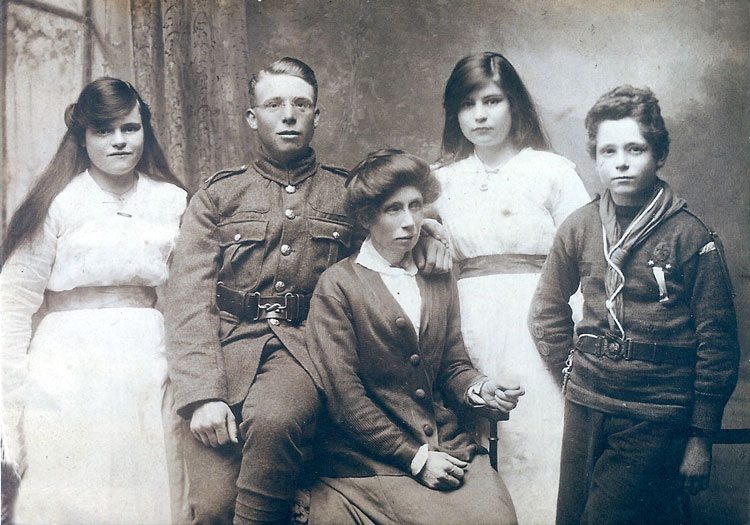
Left to right:
Laura, Harry,
Laura, Holly, Eddy.
|
|
GREAT WAR SERVICE
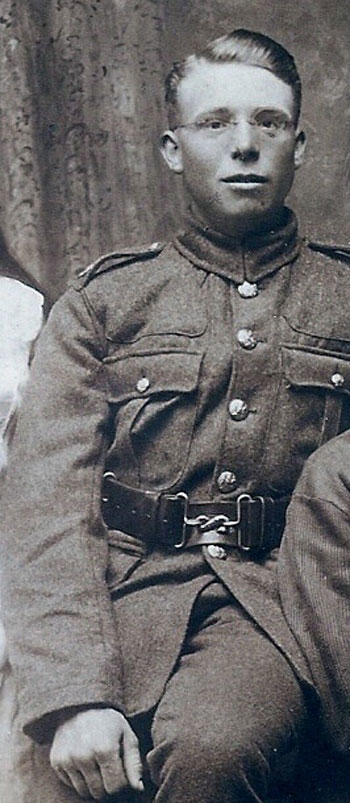 Harry
Lee Strickland Ransom
(right)
served in WW1 initially in the
5th
Battalion East Yorkshire
Regiment Cyclists. (He
used to joke about how in 1917
they still did rifle drill for a
cycle and trained using a cycle
as cover to fire from, despite
the war having been a trench one
for three years. But he enjoyed
riding around the Yorkshire coast
on his bike in the summer of
1917). Harry
Lee Strickland Ransom
(right)
served in WW1 initially in the
5th
Battalion East Yorkshire
Regiment Cyclists. (He
used to joke about how in 1917
they still did rifle drill for a
cycle and trained using a cycle
as cover to fire from, despite
the war having been a trench one
for three years. But he enjoyed
riding around the Yorkshire coast
on his bike in the summer of
1917).
Later he
transferred to the
2/6th Battalion Durham Light
Infantry (Garrison Guard).
(A Garrison Regiment
was normally
composed of men who were not fit
enough for active service
overseas).
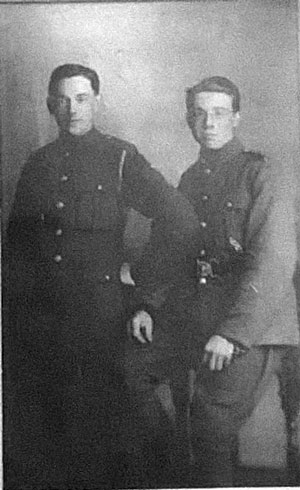 Here
he is again in the war
years
(left),
photographed with a pal who is
thought not to have survived. Here
he is again in the war
years
(left),
photographed with a pal who is
thought not to have survived.
Harry had in fact tried to
enlist much earlier. As an
over-exuberant teenager he had
stepped on to the stage at the
Hackney Empire to enlist as a
Kitchener Volunteer and claim
the King's Shilling. When
he was about to leave for France
his mother extracted him from
the Army as he was under-age.
But his ambition would
eventually be achieved.
With the
German spring offensive of 1918
in full flow and high allied
casualties the unit was sent to
France in May. In July the
Garrison Guard title was removed
and they became a fully fledged
fighting unit. They took part in
the Battle of
Albert in August and the
general final advance in
Artois and
Flanders between 2nd
October and 11th November 1918.
Harry Ransom was present at
the recapture of
Lille on 18th October - a
day he described as being one
the greatest of his life, being
cheered by thousands of people
who had been occupied for four
years. But the war left its mark
and after the Armistice he spent
three months in
Didsbury, Manchester at
the
Nell Lane Military Hospital,
recovering from Spanish Flu and
Trench fever. |
|
THE INTER-WAR YEARS AND THE
BEGINNING OF WW2
The tragedy and hardships which had bedevilled
the family continued into the
1920s.
Harry had of course
survived service on the Western
Front and all its after-effects.
Then, in 1923, his sister
Holly
Ransom
died, aged just 21, of
tuberculosis in the
outdoor sanatorium at
Lewisham Hospital. Then in 1925 his
other sister,
Laura Ransom, died at home
at the age of 25, from the same
complaint.
Fresh
air was the only known cure for
TB at that time and the
unfortunate patients at Lewisham
- who numbered dozens - were
placed outdoors under the
protection of a corrugated iron
roof whilst they waited to
recover or to die. The girls'
mother, Laura senior, wanted to
spare her other daughter, Laura,
the experience which Holly had
undergone and the result was
that Harry, using
carpentry skills
learnt in the Industrial School,
built in the
garden a small wooden chalet for
her to live in up to the time of
her death.
Still
impoverished, both sisters were
buried in unmarked public graves
in Lewisham.
Whilst he was in the
Industrial School
in his early youth and later,
during his time in France in
WW1, Harry had learnt to speak
French well. In the early 1920s
he joined a UK/French
import/export company,
Louis du Forest,
in the
City
of
London. They were
involved in the wool trade. He remained
with them for more than twenty years. During this
period Harry met his future
wife, Dorothy,
a nurse at Lewisham Hospital,
whom he married in 1926. They
later had a son, Alan,
and a daughter, Eileen.
The family was living in
Chislehurst
when WW2 started
and Eileen was evacuated
with her school to the West
Country for a year. She
returned to London in July
1940 just in
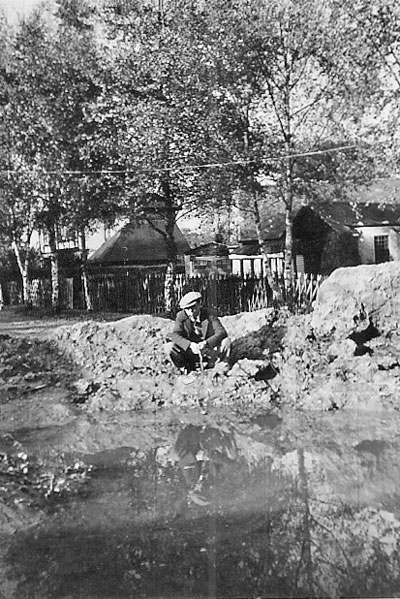 time to witness
the Battle of Britain
overhead in Kent and then
the London Blitz.
After her return, at the age of 10,
she was "appointed
Chief Spy Catcher" for the
village. She and a friend would
cycle around looking for suspicious
foreigners with suitcases, of
which there must have been quite
a few back then! time to witness
the Battle of Britain
overhead in Kent and then
the London Blitz.
After her return, at the age of 10,
she was "appointed
Chief Spy Catcher" for the
village. She and a friend would
cycle around looking for suspicious
foreigners with suitcases, of
which there must have been quite
a few back then!
In
this photograph
(left) Harry is
seen "fishing" for "Nessy" in a
pond near to his home - this is
a recently created bomb crater,
the soil still fresh around it -
and clearly he is making a joke
of the entire frightening
situation. It is probably autumn
1940, not too long after the
start of the main Luftwaffe
assault on London and other
cities which will last into
Spring 1941. Nine bombs will
fall adjacent to Harry's home
during this period but by 1941
he and his family will be living
in Yorkshire. The main
intensity of the Luftwaffe
attack, here and everywhere
else, will eventually abate as Hitler's
eyes - and those of many of his
bomber crews - turn towards Eastern Europe where Operation
Barbarossa, the invasion of
the Soviet Union, will be
launched on June 12th.
At
some point during the Blitz
Harry’s office in the City was
destroyed by the bombing and the
Ransom home damaged. This led
Harry's employer to transfer the
business to Bradford
in Yorkshire, with Harry,
Dorothy and Eileen moving with it to make
their home in that area. They
got in a cab from Chislehurst in
late December 1940 and travelled
across London on a bombing night
to get the train to Bradford and
then Saltaire;
there they they lived for a
couple of months before moving
to Shipley.
As Eileen said, "You don’t
forget a taxi ride like that
when you're ten", but the
driver was unperturbed and just
took them round the worst of the
bombing. (Harry's son, Alan, had
by then won a boarding
scholarship to Christ's Hospital
in Horsham and was away at
school from September 1939 to
July 1945, except for school
holidays).
We know little of the family's
life in Shipley but assume that
Harry
found ways, like all men at the
time who were not liable to
call-up, to "do his bit" -
possibly fire-watching or ARP
work or some other voluntary
activity. It seems as though he
did not join the Home Guard in
Chislehurst nor on arrival in
Shipley; but that changed on
27th July 1942. |
|
WW2 HOME GUARD SERVICE
In
WW2 Harry Ransom served in the Home
Guard initially as a member of
"C"
(Shipley) Company, 3rd West Riding
Battalion from
27th July 1942 to 13th May 1943.
His enrolment form survives:
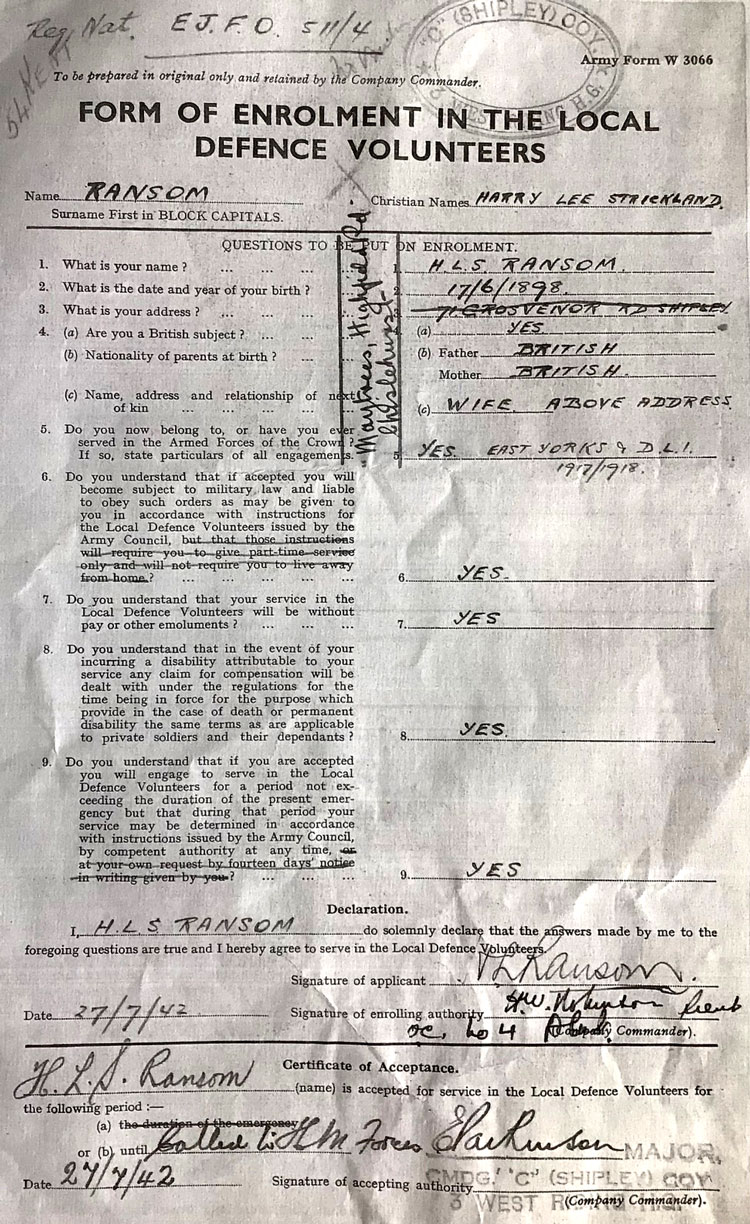
This form reveals the names of
two men prominent in the Shipley
Home Guard:
-
Major
E. Parkinson, M.C.,
late of the
Royal
Field Artillery.
He had started in the Home Guard
as a lieutenant but had risen
rapidly to the position of C.O. of
"C"
(Shipley)Company.
-
Lt.
H.W. Robinson,
late Captain,
West
Yorkshire Regiment,
and another Great War survivor;
and now C.O. of
No. 4
Platoon
in "C" Coy.
In the early part of 1943 work
commitments - presumably the return to
London of his employer - took
Harry south,
back to the
capital, in February 1943 and led to his resignation
from his Yorkshire unit -
No. 4
Platoon, "C" Company, 3rd West Riding
Battalion - and to his joining a unit
near to where he was living and
working. That was
"B"
(Chislehurst) Company, 54th Kent
Battalion.
Evidence of his move away
from Shipley - and of his home
address there, 67 Grosvenor Road,
Victoria Park, Shipley
- is contained in the following
correspondence. The letters suggest
that the Shipley Platoon had by 1943 a
degree of administrative
sophistication sufficient for
possession of
its own headed notepaper, even if Lt.
Robinson's grasp of Harry's name was a
little unsure! They also identify
Sgt.
Forbes
as the Orderly Sergeant.
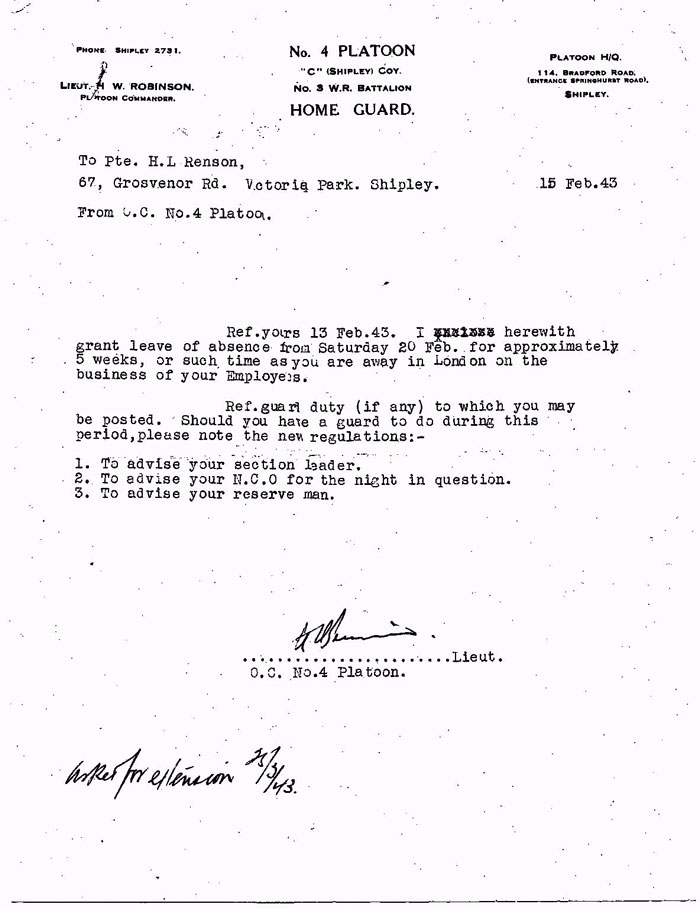 |
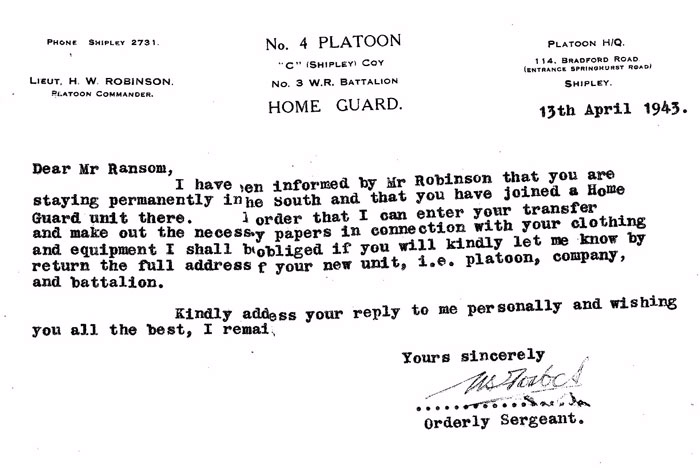 |
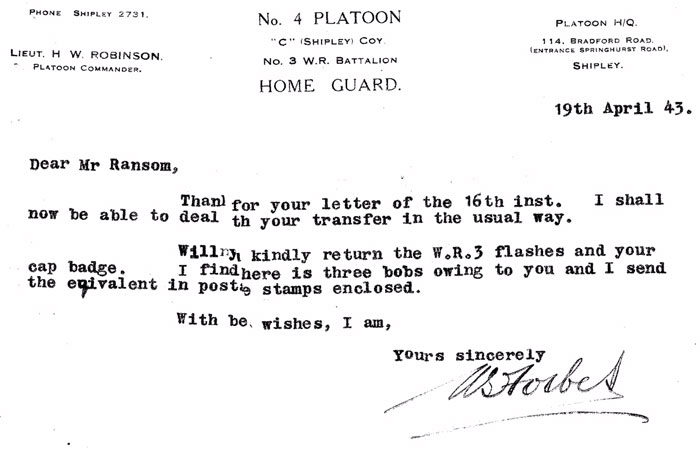
("Three bobs" = 3 shillings =
15p) |
And so Harry Ransom found
himself a member of
"C" Company of
the 54th Kent Battalion, the
Chislehurst Home Guard.
Meanwhile
Dorothy and Eileen had
stayed in Yorkshire until the end
of the latter's school year in
June/July 1943 after which they
too returned to Kent - in Eileen's
later words , “just in the
time for the V1 and V2”.
These she found more terrifying
than the Blitz: “At least with
the Blitz you had a siren warning,
the V1 and V2s just fell from the
sky”.
There are few glimpses of
Harry's time with the 54th Kent
Battalion.
A
Proficiency Certificate,
unfortunately not easily readable,
indicates that he undertook tests
in the spring of 1944. This also
confirms his rank of Lance
Corporal to which he was appointed
in July 1944.
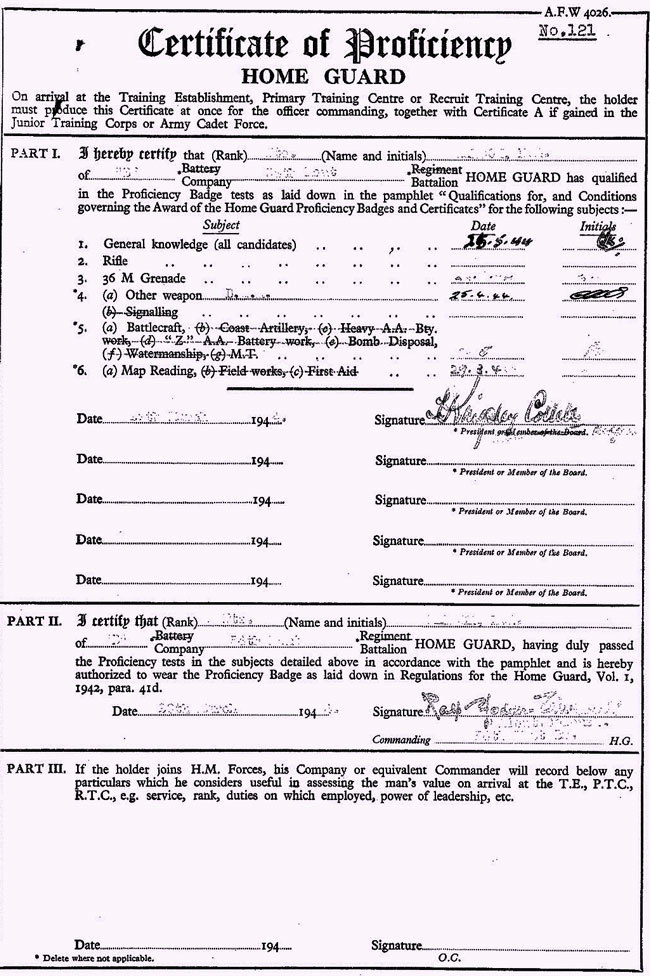 |
And, in anticipation of Stand-Down
which would eventually occur at the
beginning of December, there is a
gracious letter of appreciation from
the Company Commander which Harry
retained for the rest of his life.
This officer had, it seems, commanded
"B" Company from the very beginning
but unfortunately he remains
unidentified as his signature has yet
to be deciphered.
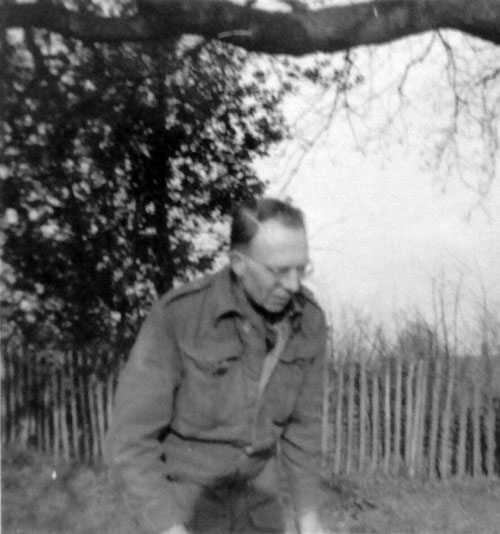
The only surviving photograph of
Harry
from that period is this one
(right). He is wearing a
battledress tunic and is engaged
in some unknown activity,
apparently in the garden. It is
likely to be part of his Home
Guard uniform but the lack of
insignia on the sleeve and its
unkempt appearance suggest that
those days are passed by and its
main use now, in the immediate
postwar months or years, is as invaluable
gardening gear.
Harry Ransom loved "Dad’s Army" and felt it
mirrored his own experience in the Chislehurst
Company.
|
AFTER THE WAR
Harry
Ransom continued to work
for his original employer after the war
up until around 1950.
At that time he went into
partnership with a business
associate forming a shipping
company called
Taurus.
Taurus
had been the name of coaster
owned by his grandfather and
crewed at some point by his
father, which plied its trade
between ports along the south
coast.
In 1962 his wife,
Dorothy, received a small inheritance
from an elderly couple she had looked after for many
years. Having been an employee for
most of his life he had always wanted to set up his own
business. So, at an age when most people are thinking
of retirement, he borrowed some of the
inheritance and set up a travel business which
became well-known in the Sussex area,
Ashdown Travel. Later,
after commissioned service in
post-war Kenya and a successful
career in international civil
engineering, his son, Alan,
returned to the U.K. and went into business with
Harry, setting up
Brittany Villas:
this company enabled
people for the
first time to take their car on a ferry from
Newhaven to Dieppe before
driving directly to a house for
a week or two's
holiday.
Harry remained working almost until the end of his
life. In his later years he was able to look
back on a well-spent life: one of initial hardships
which, even by 1982, the year of his death, must have been almost
impossible for younger people to visualise; followed
by three decades with many difficult years,
spanning two World Wars and the creation, despite
everything, of a happy family
life; and an eventual period of
success in business which must have brought with it
a well-deserved sense of personal achievement and
satisfaction.
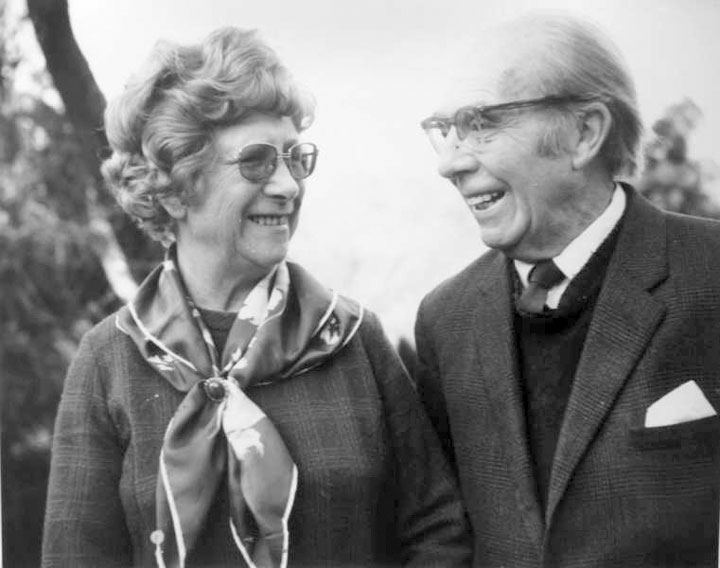
Dorothy and Harry Ransom
enjoying their Golden Wedding Anniversary,
1976. |
|
***************
ACKNOWLEDGEMENT
Grateful acknowledgement
is made to Richard Merry for these
memories of his grandfather and his
generous permission for them to be
shared within this website.
Ransom images ©
Richard Merry 2023
This online presentation ©
staffshomeguard 2023
****************
INFORMATION
IN THIS WEBSITE ABOUT THE CHISLEHURST
HOME GUARD
Within the General Information section of this website there are
interesting examples of the documentation
produced in "C" Coy. of the
54th Kent Battalion
commanded
by
Major Howard Roberts, M.C.
**********
An article on the
Chislehurst Home Guard -
"C" Coy., 54th Kent Battalion
- and its association with the Chislehurst Caves, has
recently been written by Dr. Adrian Chan-Wyles and is
published within this website with his generous
permission.
**********
and in
THIS PAGE
Richard Merry
provides information about his grandfather
Harry
Lee Strickland Ransom
(1898-1982)
**********
|
In Memory of
the Life and Service
of
L/Cpl. Harry Lee
Strickland Ransom
and of
All his Comrades
in
3rd West Riding (Bradford)
Battalion
and
54th Kent Battalion
Home Guard |
x192 - November 2023
© staffshomeguard
2023


|